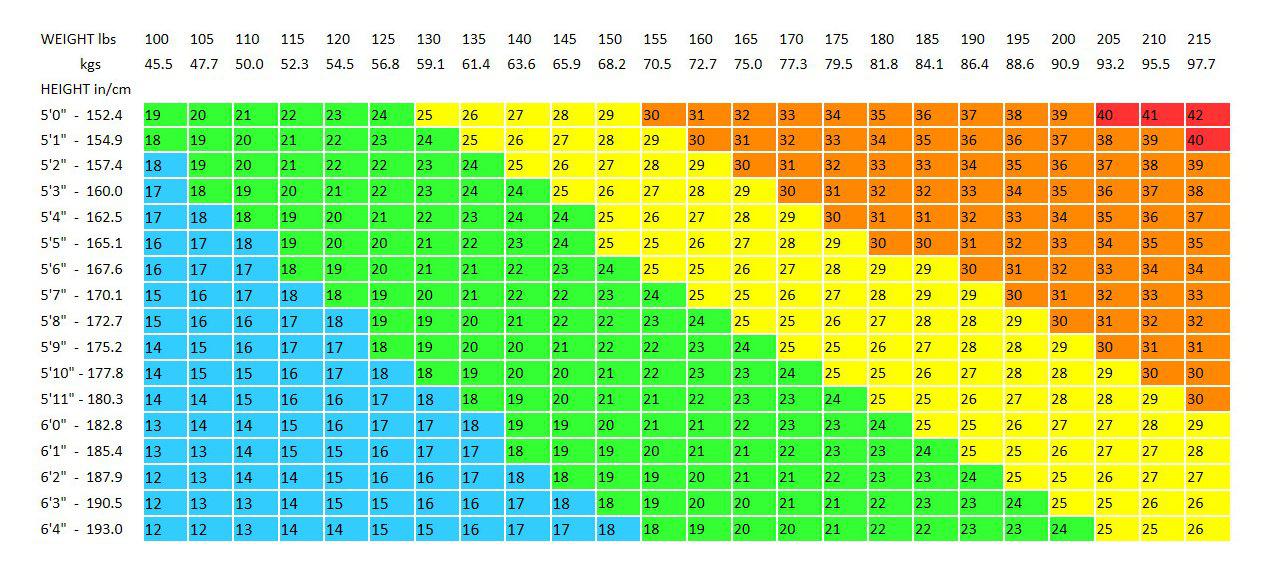BMI Calculator
Calculate your BMI (body mass index) by using the form below. Enter your weight and height and click the Calculate button to display your BMI result.
What is BMI?
The body mass index (BMI) is a measure that uses your height and weight to work out if your weight is healthy. The BMI calculation divides an adult’s weight in kilograms by their height in metres squared.
If your BMI is:
- below 18.5 – you’re in the underweight range
- between 18.5 and 24.9 – you’re in the healthy weight range
- between 25 and 29.9 – you’re in the overweight range
- above 30 – you’re in the obese range
Don't Know Weight in Pounds. Convert Weight from Kilogram to Pounds
Type a value in the Kilograms Box below to convert the value to Pounds instantly:
Weight in Pounds:
Don't Know Height in Inches. Convert Height from Centimeters to Inches
Type a value in the Centimeter Box below to convert the value to Inches instantly:
Height in Inches:
BMI Calculator – FAQs
How do I calculate my BMI?
BMI or body mass index is a measure of how much body mass an individual has according to his weight and height. To calculate your BMI, simply divide your weight in kilograms by your height squared in meters. You can also find the results instantly by entering the height and weight data in online BMI calculators. BMI is not always an appropriate indicator of a person’s health. Growing children and elderly people may have less muscle mass and therefore lower weight, thus lowering their BMI. On the other hand, athletes may have higher BMI as they put on plenty of muscle from exercise.
How is BMI measured?
The BMI formula is quantified as kg/m2 for most adults, irrespective of gender. The formula that uses kilograms and meters is called a metric BMI formula while the one that uses pounds and inches for measurement is called the imperial BMI formula. The BMI score chart is applied to adults aged 20 and above. A BMI between 18.5 and 25 is considered normal, between 25 and 30 overweight, between 30 to 35 fat, and between 35 and 40 too fat. BMI should preferably be measured first thing in the morning before breakfast, the time when your weight is most accurate.
What is ideal BMI for a man?
aintaining a healthy body weight is important for everyone. According to the Center for Disease Control, men who have a BMI of 30 and above are obese, between 18.5 and 25 are considered normal, those with BMI below 18.5 are labelled underweight and those with BMI between 25 and 29 are considered overweight. As a thumb rule, taller men should weigh more than shorter guys, generally 2 to 4 points more per inch of height. The tendency to put on weight also increases with age, even though height, body frame and gender play crucial roles in determining your BMI levels.
What is ideal BMI for a woman?
The ideal, overweight, underweight and obese BMI ranges for men and women are the same with only minor differences. A National Institute for Health, USA study found that women who had never smoked but were overweight had a 13 per cent increased chance of dying, than those with a BMI between 22.5 and 24.9. Women who are obese or severely obese had significantly higher chances of dying early. Researchers saw a 44 per cent rise in risk of death for participants with BMI of 30 to 35 and an 88 per cent upside in risk for those with a BMI of 35 to 40, followed by a 250 per cent higher risk of dying for women whose BMIs fell between 40 and 49.
How much should I weigh for my height and age?
BMI figures are responsive to changes in height but not to age. Maintaining a healthy BMI as you grow older becomes tough as due to a slowed metabolism you tend to put on more weight, mostly on the waistline. After 20 years of age, the height of a person becomes more or less settled. Weight therefore becomes the variable that you should take into account. It is alright for a taller person to weigh more than a shorter person. The guideline to follow here is irrespective of how old or how young you are, your BMI should fall within 18.5 and 25.

